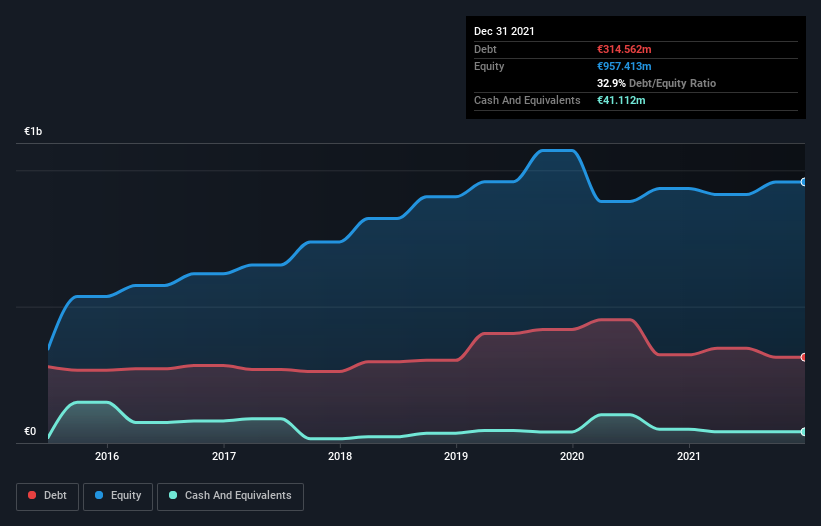Some say volatility, rather than debt, is the best way to think about risk as an investor, but Warren Buffett famously said that 'Volatility is far from synonymous with risk.' It's only natural to consider a company's balance sheet when you examine how risky it is, since debt is often involved when a business collapses. We note that Dalata Hotel Group plc (ISE:DHG) does have debt on its balance sheet. But the real question is whether this debt is making the company risky.
When Is Debt Dangerous?
Debt assists a business until the business has trouble paying it off, either with new capital or with free cash flow. If things get really bad, the lenders can take control of the business. However, a more common (but still painful) scenario is that it has to raise new equity capital at a low price, thus permanently diluting shareholders. Having said that, the most common situation is where a company manages its debt reasonably well - and to its own advantage. When we examine debt levels, we first consider both cash and debt levels, together.
See our latest analysis for Dalata Hotel Group
What Is Dalata Hotel Group's Debt?
The chart below, which you can click on for greater detail, shows that Dalata Hotel Group had €314.6m in debt in December 2021; about the same as the year before. However, because it has a cash reserve of €41.1m, its net debt is less, at about €273.5m.

How Strong Is Dalata Hotel Group's Balance Sheet?
According to the last reported balance sheet, Dalata Hotel Group had liabilities of €94.9m due within 12 months, and liabilities of €837.7m due beyond 12 months. Offsetting this, it had €41.1m in cash and €9.74m in receivables that were due within 12 months. So its liabilities total €881.7m more than the combination of its cash and short-term receivables.
This is a mountain of leverage relative to its market capitalization of €959.4m. This suggests shareholders would be heavily diluted if the company needed to shore up its balance sheet in a hurry.
We measure a company's debt load relative to its earnings power by looking at its net debt divided by its earnings before interest, tax, depreciation, and amortization (EBITDA) and by calculating how easily its earnings before interest and tax (EBIT) cover its interest expense (interest cover). This way, we consider both the absolute quantum of the debt, as well as the interest rates paid on it.
Dalata Hotel Group shareholders face the double whammy of a high net debt to EBITDA ratio (8.0), and fairly weak interest coverage, since EBIT is just 0.22 times the interest expense. This means we'd consider it to have a heavy debt load. However, the silver lining was that Dalata Hotel Group achieved a positive EBIT of €7.3m in the last twelve months, an improvement on the prior year's loss. The balance sheet is clearly the area to focus on when you are analysing debt. But ultimately the future profitability of the business will decide if Dalata Hotel Group can strengthen its balance sheet over time. So if you're focused on the future you can check out this free report showing analyst profit forecasts.
But our final consideration is also important, because a company cannot pay debt with paper profits; it needs cold hard cash. So it's worth checking how much of the earnings before interest and tax (EBIT) is backed by free cash flow. Over the last year, Dalata Hotel Group actually produced more free cash flow than EBIT. There's nothing better than incoming cash when it comes to staying in your lenders' good graces.
Our View
Dalata Hotel Group's interest cover and net debt to EBITDA definitely weigh on it, in our esteem. But its conversion of EBIT to free cash flow tells a very different story, and suggests some resilience. When we consider all the factors discussed, it seems to us that Dalata Hotel Group is taking some risks with its use of debt. While that debt can boost returns, we think the company has enough leverage now. Even though Dalata Hotel Group lost money on the bottom line, its positive EBIT suggests the business itself has potential. So you might want to check out how earnings have been trending over the last few years.
If you're interested in investing in businesses that can grow profits without the burden of debt, then check out this free list of growing businesses that have net cash on the balance sheet.
New: Manage All Your Stock Portfolios in One Place
We've created the ultimate portfolio companion for stock investors, and it's free.
• Connect an unlimited number of Portfolios and see your total in one currency
• Be alerted to new Warning Signs or Risks via email or mobile
• Track the Fair Value of your stocks
Have feedback on this article? Concerned about the content? Get in touch with us directly. Alternatively, email editorial-team (at) simplywallst.com.
This article by Simply Wall St is general in nature. We provide commentary based on historical data and analyst forecasts only using an unbiased methodology and our articles are not intended to be financial advice. It does not constitute a recommendation to buy or sell any stock, and does not take account of your objectives, or your financial situation. We aim to bring you long-term focused analysis driven by fundamental data. Note that our analysis may not factor in the latest price-sensitive company announcements or qualitative material. Simply Wall St has no position in any stocks mentioned.
About ISE:DHG
Dalata Hotel Group
Owns, leases, and manages hotels under the Maldron Hotels and Clayton Hotels brand names in Dublin, Regional Ireland, the United Kingdom, and Continental Europe.
Mediocre balance sheet second-rate dividend payer.
Similar Companies
Market Insights
Community Narratives



